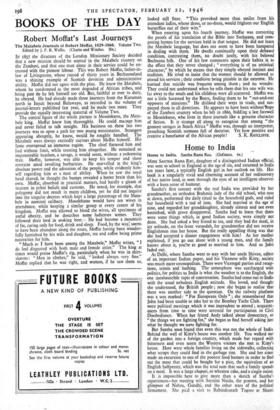BOOKS OF THE DAY
Robert Moffat's Last Journeys
The Matabele Journals of Robert Moffat, 1829-1860. Volume Two. Edited by J. P. R. Wallis. (Chatto and Windus. 30s.)
IN 1857 the directors of the London Missionary Society decided that a new mission should be started in the Matabele country on the Zambesi, and that one man alone in their service could be en- trusted with the pioneer labour. This was Robert Moffat, father-in- law of Livingstone, whose record of thirty years in Bechuanaland was a shining example of Scottish devotion and administrative ability. Moffat did not agree with the plan. He knew the Matabele, whom he condemned as the most degraded of African tribes, and being past 6o he felt himself too old. But, faithful as ever to duty, he obeyed. He had already made three journeys from the Kuruman north to Inyati beyond Buluwayo, as recorded in the volume of journal-letters published last year, and he made two more. They provide the equally interesting material of Volume Two.
The central figure of the whole picture is Moselekatse, the Mata- bele king. Moffat knew him thoroughly. He could manage him and never failed to talk straight. His business on these last two journeys was to open a path for two young missionaries. Strangers appearing abruptly, he knew, would be roughly handled. The Matabele were always excitedly curious about Moffat himself. His fame overspread an immense region. The chief flattered him and lied without limit, while trusting him altogether. He remained an impenetrable heathen, a savage, it would seem, without a redeeming trait. Moffat, however, was able to keep his temper and show restraint amid revolting barbarities. He marvelled at the king's absolute power and the adoration of the people, while evidently him- self regarding him as a man of ability. When he saw the royal head shaved, he thought the bumps revealed a better brain than his own. Moffat, absorbed in practical matters, had hardly a gleam of interest in tribal beliefs and customs. He noted, for example, that polygamy did not result in many children, yet he did not inquire into the singular decrees which kept a large percentage of the Mata- bele in nominal celibacy. Moselekatse would have ten wives in attendance, while keeping a similar group at every centre of his kingdom. Moffat was allowed to bleed the wives, all specimens of awful obesity, and he describes some ludicrous scenes. They followed their lord in soaking beer. He had become a mountain of fat, caring only for food, drink and sleep. Food, by the way; seems to have been abundant along the route, Moffat having been wonder- fully furnished by his wife and daughter, tea and coffee being prime necessities for him.
" Much as I have been among the Matabele," Moffat writes, " I do feel disgusted with both male and female attire." The king at times would praise Moffat's rig, particularly when he was in shirt- sleeves: " Men in clothes," he said, " looked always very fine." Moffat replied that he was right, and women, if he saw them so, looked still finer. "This provoked more than smiles from his attendant ladies, whose dress, or no-dress, would frighten our English butterflies out of their wits."
When entering upon his fourth journey, Moffat was correcting the proofs of his translation of the Bible into Sechuana, and com- posing hymns for the services held in that tongue. He did not learn the Matabele language, but does not seem to have been hampered in dealing with them. He dwells continually upon their debased condition, contrasting them, no doubt justly, with his beloved Bechuana folk. One of his few comments upon their habits is to the effect that they never changed ; " everything is of an artistical character," by which he means that they simply obeyed instinct and tradition. He tried to insist that the women should be allowed to attend his services ; their condition being pitiable in the extreme. He learned that suicide was frequent among them ; and no wonder. They could not understand when he tells them that his one wife was far away to the south and his children were all scattered. Moffat was not a little harassed by the Boers, finding them to be "out-and-out opposers of missions." He disliked their ways in trade, and sus- pected them in all directions. He appears to have been wiihoutihope of the Zambesi country when he left in 186o, bidding a last farewell to Moselekatse, who lives in these journals like a genuine character of fiction. It is strange all along to- recognise that among " the greatest savages in South Africa " Moffat was, through an interpreter, preaching Scottish sermons full of doctrine. Yet how positive and creative a benefaotor of the African people! S. K. RATCLIFFE.






























 Previous page
Previous page